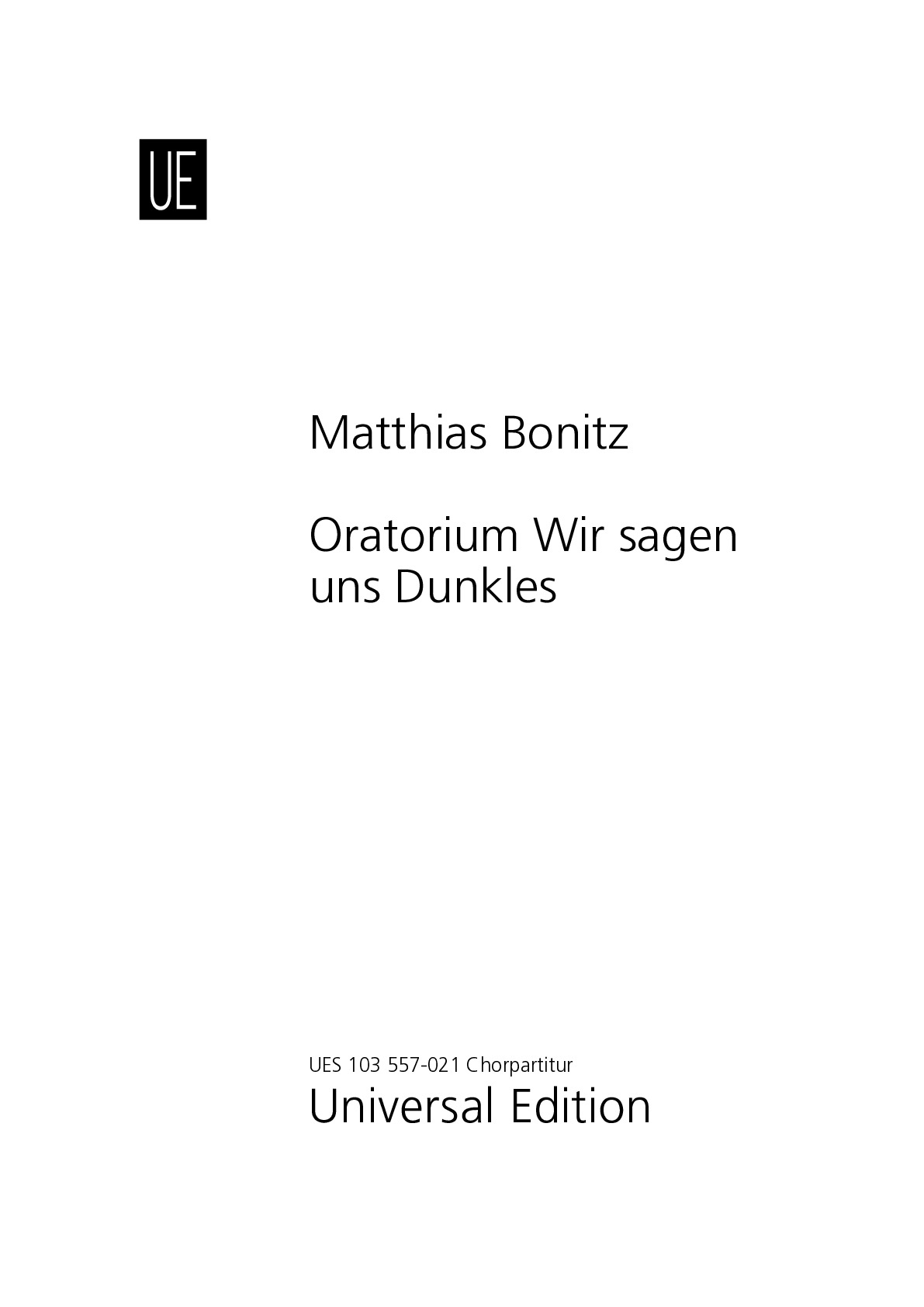.png)
Digital edition
immediately available as PDF
€33.95
Payments:
Shipping:
Matthias Bonitz
gemischter Chor (Oratorium Wir sagen uns Dunkles)
UES103557-021
Type: Chorpartitur
Format: 210 x 297 mm
Pages: 252
Digital edition
immediately available as PDF
€33.95
Payments:
Shipping:
Audio preview
Description
Mein - weltliches - Oratorium in 4 Teilen Wir sagen uns Dunkles beleuchtet musikalisch die Beziehung und das Große
Auseinandersetzung zweier bedeutendster Protagonisten der deutschen Nachkriegslyrik: Ingeborg Bachmann und Paul Celan.
The title of the oratorio is revealing: Wir sagen uns Dunkles is the secret code of this relationship from the beginning (1948) until death for both of
them; Wir sagen uns Dunkles is a core statement from the poem Corona by Paul Celan, written in Vienna in 1948 and published in the poetry collection Mohn und Gedächtnis by P. Celan.
The oratorio is divided into 4 parts - or sections. The basis of my composition are 6 poems by Paul Celan and 7 poems by Ingeborg Bachmann and psalms.
In the 1st part I refer primarily to the origin of Celan. The Jews of Bukovina were the keepers of the German language and culture for a long time after the end of the First World War. The poet Paul Celan came from there, "a region," as he himself put it, "where people and books lived." The fate of the Jews in the Nazi era and its effects on the survivors like Celan, who suffered from a "survivor's guilt" all his life, is the content of the 1st part, here instrumentally introduced by excerpts from my piano quartet Schachnovelle (after Stefan Zweig). In Hebrew follows Psalm 38 (2013 in collaboration with the Jewish cantor
Mimi Scheffer from Berlin). Tenebrae75 (The number 75 refers to 75 years after the liberation of the Auschwitz concentration camp by the on January 27, 1945, I finished the composition Tenebrae75, 75 years after the liberation on January 27, 2020) is named after the poem Tenebrae by Paul Celan that I expanded in the introduction with verses from Psalms 22, 25, 28 and 79, inserted also in Hebrew the Shma`JIsrael Adonai elohenu Adonai echat.
The 1st part closes with the poems Geh, Gedanke by Ingeborg Bachmann, Psalm (Celan) and Psalm (Bachmann).
The 2nd part deals with the intense love relationship in the summer of 1948; the poems In Ägypten (Celan), Es könnte viel bedeuten (Bachmann), Corona (Celan) and Entfremdung (Bachmann) stand for this period.
In the 3rd part, the rekindled love relationship in 1957 (conference in Wuppertal and hotel in Cologne) is thematized by the poems Köln, Am Hof (Celan), Erklär mir, Liebe (Bachmann) and Nachts, wenn das Pendel der Liebe schwingt (Celan).
In the 4th part: Finale stands for "the impossibility of living together", as Bachmann characterizes this relationship already in 1951 in a letter to Hans Weigel. I try to represent this tragedy through my tone poem Kagrans Flucht (Kagran's Flight), based on the internal fairy tale from Bachmann's novel Malina, which refers to Celan (mysterious stranger) and was included in the novel by Bachmann after Celan's tragic suicide in 1970. The final poems are Lieder auf der Flucht XV (Bachmann) and Thema und Variation (Bachmann).
More information
Type: Chorpartitur
Format: 210 x 297 mm
Pages: 252

